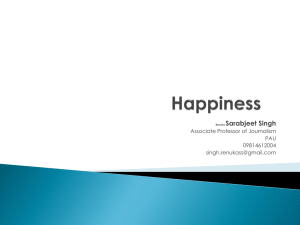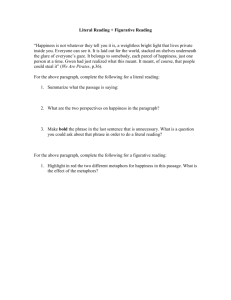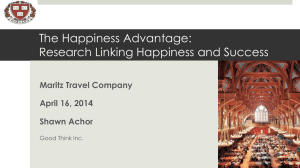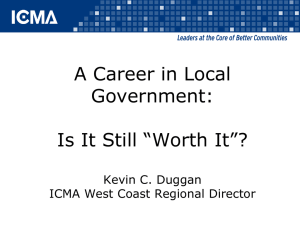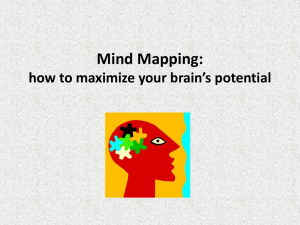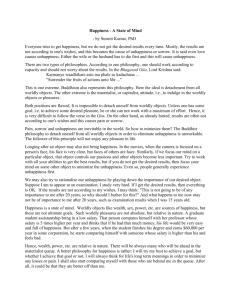Quotes from “The Conquest of Happiness” by Bertrand Russell
advertisement
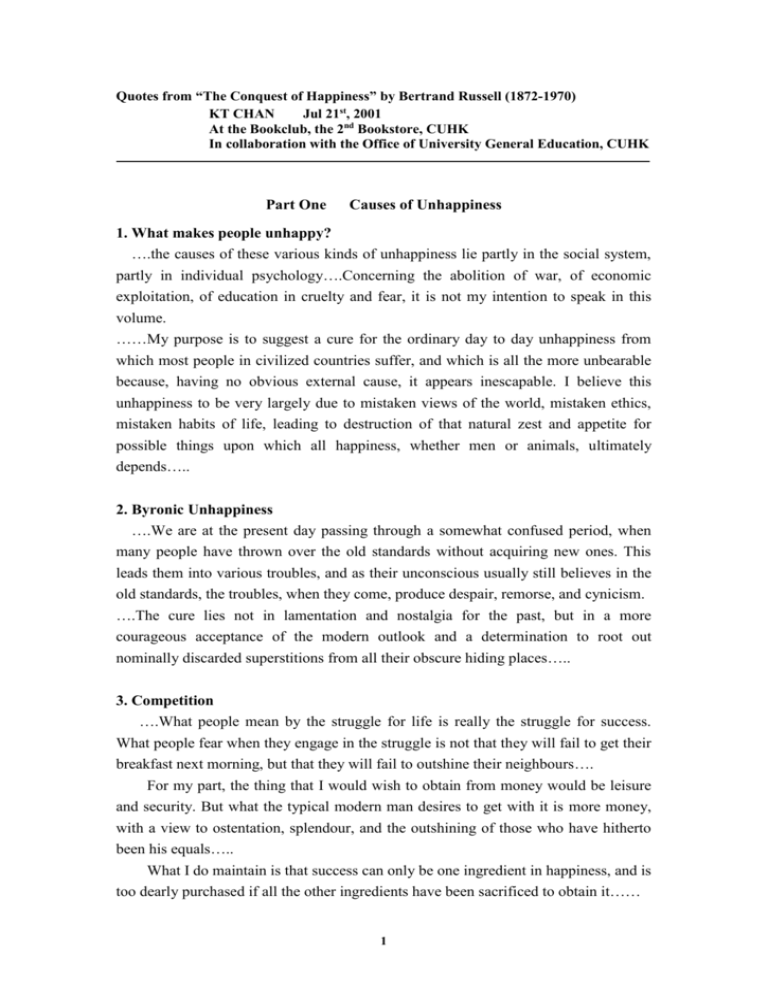
Quotes from “The Conquest of Happiness” by Bertrand Russell (1872-1970) KT CHAN Jul 21st, 2001 At the Bookclub, the 2nd Bookstore, CUHK In collaboration with the Office of University General Education, CUHK Part One Causes of Unhappiness 1. What makes people unhappy? ….the causes of these various kinds of unhappiness lie partly in the social system, partly in individual psychology….Concerning the abolition of war, of economic exploitation, of education in cruelty and fear, it is not my intention to speak in this volume. ……My purpose is to suggest a cure for the ordinary day to day unhappiness from which most people in civilized countries suffer, and which is all the more unbearable because, having no obvious external cause, it appears inescapable. I believe this unhappiness to be very largely due to mistaken views of the world, mistaken ethics, mistaken habits of life, leading to destruction of that natural zest and appetite for possible things upon which all happiness, whether men or animals, ultimately depends….. 2. Byronic Unhappiness ….We are at the present day passing through a somewhat confused period, when many people have thrown over the old standards without acquiring new ones. This leads them into various troubles, and as their unconscious usually still believes in the old standards, the troubles, when they come, produce despair, remorse, and cynicism. ….The cure lies not in lamentation and nostalgia for the past, but in a more courageous acceptance of the modern outlook and a determination to root out nominally discarded superstitions from all their obscure hiding places….. 3. Competition ….What people mean by the struggle for life is really the struggle for success. What people fear when they engage in the struggle is not that they will fail to get their breakfast next morning, but that they will fail to outshine their neighbours…. For my part, the thing that I would wish to obtain from money would be leisure and security. But what the typical modern man desires to get with it is more money, with a view to ostentation, splendour, and the outshining of those who have hitherto been his equals….. What I do maintain is that success can only be one ingredient in happiness, and is too dearly purchased if all the other ingredients have been sacrificed to obtain it…… 1 The cure for this lies in admitting the part of sane and quiet enjoyment in a balanced ideal of life. 4. Boredom and excitement …..The special kind of boredom from which modern urban populations suffer is intimately bound up with their separation from the life of Earth….. A happy life must be to a great extent a quiet life, for it is only in an atmosphere of quiet that true joy can live. 5. Fatigue …..The important kind of fatigue is always emotional in modern life; …… The harm that is attributed to overwork is hardly ever due to that cause, but to some kind of worry or anxiety. The trouble with emotional fatigue is that it interferes with rest. ……When some misfortune threatens, consider seriously and deliberately what is the very worst that could possibly happen. Having looked this possible misfortune in the face, give yourself sound reasons for thinking that after all it would be no such very terrible disaster…. Worry is a form of fear, and all forms of fear produce fatigue. 6. Envy …..The habit of thinking in terms of comparisons is a fatal one. When anything pleasant occurs it should be enjoyed to the full,….. You can get away from envy by enjoying the pleasures that come your way, by doing the work that you have to do, and by avoiding comparisons with those whom you imagine, perhaps quite falsely, to be more fortunate than yourself…. ….the human heart as modern civilization has made it is more prone to hatred than to friendship. And it is prone to hatred because it is dissatisfied, because it feels deeply, perhaps even unconsciously, that it has somehow missed the meaning of life……To find the right road out of this despair civilized man must enlarge his heart as he has enlarged his mind. He must learn to transcend self, and in so doing to acquire the freedom of the Universe. 7. The Sense of Sin ….Our traditional morality has been unduly self centred, and the conception of sin is part of this unwise focusing of attention upon self. 8. Persecution Mania …. To detect in himself the elements od persecution mania, and having detected them, can eliminate them. This is an important part of the conquest of happiness, since it is quite impossible to be happy if we feel that everybody ill treats us. 2 ….4 maxims to prevent persecution mania: i. Remember your motives are not always as altruistic as they seem to yourself. ii.Do not overestimate your own merits. iii. Do not expect others to take as much interest in you as you do yourself. iv. Do not imagine that most people give enough thought to you to have any special desire to persecute you. 9. Fear of Public Opinion ……To almost everybody sympathetic surroundings are necessary to happiness. Fear of public opinion, like every other form of fear, is oppressive and stunts growth…..it is essential to happiness that our way of living should spring from our own deep impulses and not from the accidental tastes and desires of those who happen to be our neighbours, or even our relations. Part Two: Causes of Happiness 10. Is Happiness still Possible? …….Fundamental happiness depends more than anything else upon what may be called a friendly interest in persons and things. …….The secret of happiness is this: let your interests be as wide as possible, and let your reactions to the things and persons that interest you be as far as possible friendly rather than hostile….. 11. Zest ……What hunger is in relation to food, zest is in relation to life…..In the good life there must be a balance between different activities….All our separate tastes and desires have to fit into the general framework of life. If they are to be a source of happiness they must be compatible with health, with the affection of those we love, and with the respect of the society in which we live. 12. Affection …….Those who face life with a feeling of security are much happier than those who face it with a feeling of insecurity,….. …….The child from whom for any reason parental affection is withdrawn is likely to become timid and unadventurous, filled with fears and self pity, and no longer able to meet the world in a mood of gay exploration. …….A too powerful ego is a prison from which a man must escape if he is to enjoy the world to the full. A capacity for genuine affection is one of the marks of the man who has escaped from this prison of self……..Of all forms of caution, caution in love is perhaps the most fatal to true happiness. 3 13. Family …….The parent who genuinely desires the child’s welfare more than his or her power over the child will not need textbooks on psychoanalysis to say what should and what should not be done, but will be guided aright by impulse….this demands on the part of the parent from the first a respect for the personality of the child…… ……..Many a child is psychologically ruined by ignorant and sentimental handling on the part of its mother. 14. Work ….Continuity of purpose is one of the most essential ingredients of happiness in the long run, and for most men this comes chiefly through their work. Two chief elements make work interesting: first, the exercise of skill, and second, construction. 15. Impersonal interests …….All impersonal interest, apart from their importance as relaxation, have various other uses……they help a man to retain his sense of proportion. …..It is one of the defects of modern higher education that it has become too much a training in the acquisition of certain kinds of skill, and too little an enlargement of the mind and heart by any impartial survey of the world….the man who pursues happiness wisely will aim at the possession of a number of subsidiary interests in addition to those central ones upon which his life is built. 16. Effort and Resignation ……happiness must be,…..an achievement rather than a gift of the gods, and in this achievement effort, both inward and outward, must play a great part. The inward effort may include the effort of resignation……e.g. marriage, rearing a child…. A certain kind of resignation is involved in willingness to face truth about ourselves; this will afford protection against the disappointments and disillusionments to which the self deceiver is liable. 17. The Happy Man (This is the last chapter of the book) ……a man comes to feel himself part of the stream of life, not a hard separate entity like a billiard ball,….the greatest joy is to be found in this instinctive union… 4

